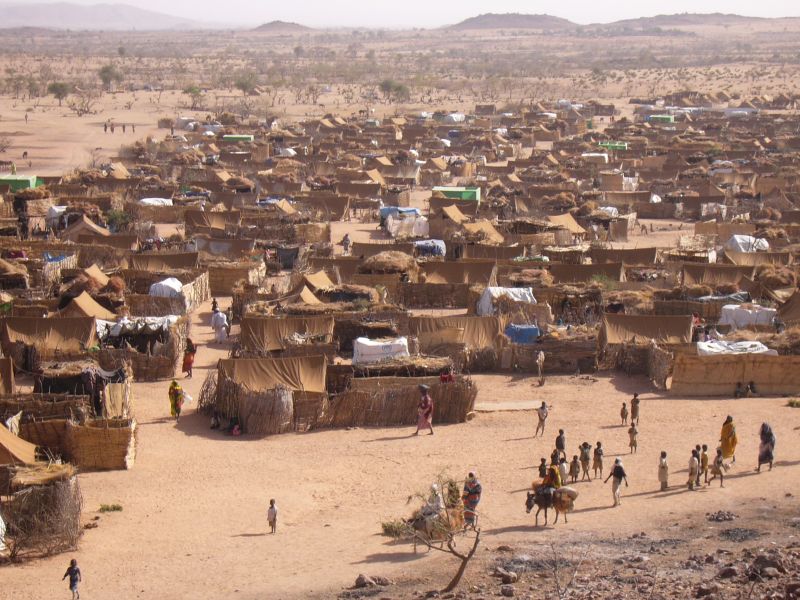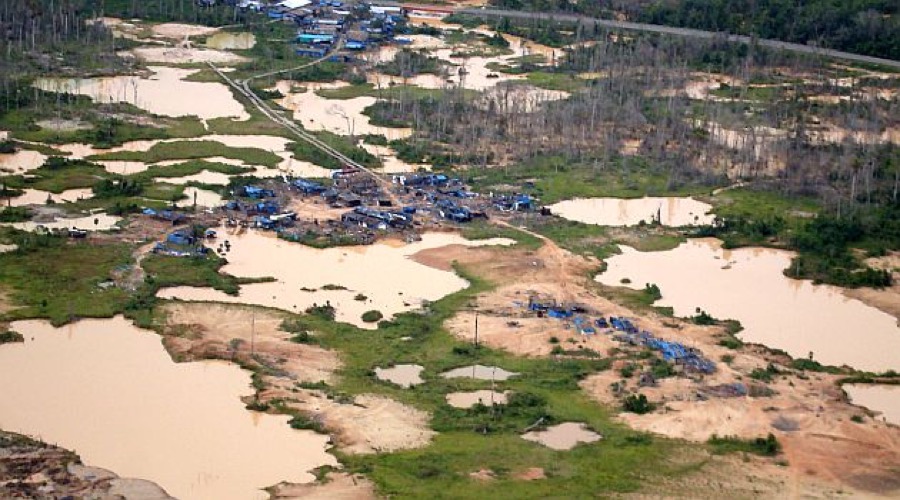Bloomberg News | June 10, 2022

Refugee camp in Chad. Credit: Wikimedia Commons
Chad’s looking to reassert control over its gold reserves, a longtime source of conflict and smuggling, following an upsurge of deadly clashes in mining regions.

The landlocked Central African country’s interim leader, Colonel Mahamat Idriss Deby, wants to profit from gold mined in the far north, a largely stateless region controlled by armed militias. Chad is currently facing a food-security crisis and struggling to reach a deal with external creditors including commodity trading giant Glencore Plc to restructure $2.8 billion of external debt.
Gold worth 57 billion CFA francs ($91 million) leaves Chad each week heading for Libya, Deby told state broadcaster Tele Tchad in an interview aired on June 9.
“That’s enormous and it needs to stop,” Deby said during a visit to Kouri Bougoudi, a northern town where at least 100 small-scale miners died in clashes over access to gold last month.
Deby’s estimate of the value of gold smuggled out of the country dwarfs Chad’s official gold exports, which amounted to about $200 million in 2020, according to World Bank Data.
Gold mining in the tri-border area between Chad, Libya and Niger has long posed a security challenge to the administration in the capital, N’Djamena.
In early 2021, Libya-based rebels used the border region to launch an assault to overthrow Deby’s father, longtime leader General Idriss Deby. The repressive ruler was killed during a visit to the frontline on April 20, according to interim authorities.
Chad is still reeling from the impact of Deby’s death, while struggling with the global economic shock caused by the coronavirus pandemic, climate change and regional instability.
A restructuring of its external debt under the G20 Common Framework that would free up much-needed resources — including oil revenue — has stalled as Chad and its creditors have failed to agree on the terms.
Deby on Thursday vowed to ensure that Chadians would benefit from the gold mines in Kouri Bougoudi.
“We will put in place mining services, tax authorities and customs. Foreigners who want to mine here will need a permit to do so,” Deby said. “The state will get its part, while the province will be entitled to 5% of revenue from its natural resources.”
He denied the evacuation of small-scale miners by security forces was an attempt by authorities to hand over the mines to foreign actors. Previous attempts to industrialize Chad’s gold reserves have failed due to insecurity and the lack of infrastructure in the remote region, according to a recent report by the RHIPTO Norwegian Center for Global Analyses.
(By Katarina Hoije)
In Bolivia’s Amazon, wildcat gold mining boom stokes tension over environment
Reuters | June 10, 2022 |

Through the years, miners have devastated an area of the Peruvian Amazon that’s almost five times the size of Manhattan. (Image from archives)
In Bolivia’s Amazon tensions are rising over a boom in wildcat gold mining that is driving a surge in imports of mercury used to extract the precious metal and is sparking conflict between small-scale prospectors and local indigenous groups.

The landlocked South American nation has seen gold production spike in the last five years, with an important amount of that coming from artisanal miners, officials say. That has risen with the global gold price elevated in recent years.
Officials and indigenous leaders are now worried about how the mining is impacting the local environment and waterways, and encroaching on indigenous lands as has happened in the Amazon in Peru and Brazil, with miners increasingly emboldened.
“We’ve been received with firecrackers and dynamite, they’ve thrown stones at us,” Bolivian Senator Cecilia Requena told Reuters during a trip to a tiny hamlet along the Beni River in the country’s north, a hot spot for illegal gold mining.
During the trip in May Reuters saw signs everywhere along the river of mining machinery and heard explosions from mining operations. Requena showed Reuters a video of one recent visit when her boat had been attacked by a man throwing rocks.
“You’ve been warned haven’t you?,” the man yelled.
The rise in wildcat mining has seen Bolivia, a country of some 12 million people, become the world’s top importer of mercury since 2019, according to the Observatory of Economic Complexity (OEC), which tracks global trade flows.
Mercury is key to wildcat gold mining and experts say its growth is a reflection of how the industry has boomed.
“Small scale mining activity and the use of mercury in the country has increased,” Marcos Orellana, the U.N. Special Rapporteur on toxics and human rights, told Reuters.
“The use of mercury in gold mining has severe impacts on environmental protection, deforestation and especially on the rights of indigenous peoples,” he explained, adding it contaminated waters used for washing and fishing.
Bolivia’s mining ministry did not respond to requests for comment by Reuters for this story.
“We truly are totally polluted here,” said Isidro Flores, a leader of the Correo indigenous community that lives next to the river. “You can’t even take a bath or drink. We used to fish in the river and now we can’t, everything is polluted.”
Requena, a centrist lawmaker, has become a vocal activist trying to set rules to curb wildcat mining in Bolivia’s Amazon.
“We’ve received signals that we are being threatened,” Requena said. “People say they have the right to carry out mining and nobody can take that away from them. They say they will fight and use violence if necessary.”
(By Segio Limachi, Marcelo Rochabrun and Monica Machicao; Editing by Adam Jourdan and Diane Craft)
No comments:
Post a Comment